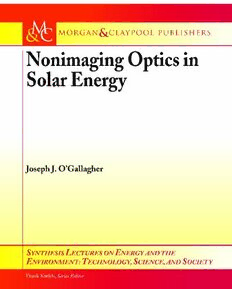
Nonimaging Optics in Solar Energy Synthesis Lectures on Energy and the Environment Technology S PDF
133 Pages·2008·8.581 MB·English
Most books are stored in the elastic cloud where traffic is expensive. For this reason, we have a limit on daily download.
Preview Nonimaging Optics in Solar Energy Synthesis Lectures on Energy and the Environment Technology S
Description:
Nonimaging optics is a subdiscipline of optics whose development over the last 35–40 years was led by scientists from the University of Chicago and other cooperating individuals and institutions. The approach provides a formalism that allows the design of optical devices that approach the maximum physically attainable geometric concentration for a given set of optical tolerances. This means that it has the potential to revolutionize the design of solar concentrators. In this monograph, the basic practical applications of the techniques of nonimaging optics to solar energy collection and concentration are developed and explained. The formalism for designing a wide variety of concentrator types, such as the compound parabolic concentrator and its many embodiments and variations, is presented. Both advantages and limitations of the approach are reviewed. Practical and economic aspects of concentrator design for both thermal and photovoltaic applications are discussed as well. The whole range of concentrator applications from simple low-concentration nontracking designs to ultrahigh-concentration multistage configurations is covered. Table of Contents: Introduction / CPCs / Practical Design of CPC Thermal Collectors / Practical Design of CPC PV Concentrators / Two-Stage Nonimaging Concentrators for Solar Thermal Applications / Two-Stage Nonimaging Concentrators for Solar PV Applications / Selected Demonstrations of Nonimaging Concentrator Performance / The Importance of Economic Factors in Effective Solar Concentrator Design / Ultrahigh Concentration / Bibliography
See more
The list of books you might like
Most books are stored in the elastic cloud where traffic is expensive. For this reason, we have a limit on daily download.
